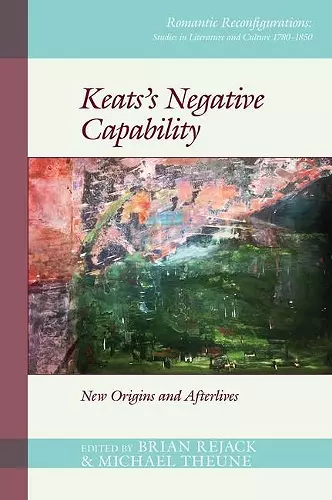Keats’s Negative Capability
New Origins and Afterlives
Michael Theune editor Brian Rejack editor
Format:Hardback
Publisher:Liverpool University Press
Published:18th Jan '19
Should be back in stock very soon
This hardback is available in another edition too:
- Paperback£30.25(9781800856721)

In late December 1817, when attempting to name “what quality went to form a Man of Achievement especially in Literature,” John Keats coined the term “negative capability,” which he glossed as “being in uncertainties, Mysteries, doubts, without any irritable reaching after fact & reason.” Since then negative capability has continued to shape assessments of and responses to Keats’s work, while also surfacing in other contexts ranging from contemporary poetry to punk rock. The essays collected in this volume, taken as a whole, account for some of the history of negative capability, and propose new models and directions for its future in scholarly and popular discourse. The book does not propose a particular understanding of negative capability from among the many options (radical empathy, annihilation of self, philosophical skepticism, celebration of ambiguity) as the final word on the topic; rather, the book accounts for the multidimensionality of negative capability. Essays treat negative capability’s relation to topics including the Christmas pantomime, psychoanalysis, Zen Buddhism, nineteenth-century medicine, and Philip Pullman’s His Dark Materials trilogy. Describing the “poetical Character” Keats notes that “it enjoys light and shade; it lives in gusto, be it foul or fair, high or low, rich or poor, mean or elevated.” This book, too, revels in such multiplicity.
‘That this book ranges so richly, so variously, and so widely will be welcome to all readers, not least because it embodies the Shakespearean aspects of negative capability.’
Nicholas Roe, Wardlaw Professor of English Literature at the University of St Andrews
‘Keats's Negative Capability will ... prompt [its readers] to think again and anew and unceasingly on what negative capability was, is, and can become.’
Jonathan Mulrooney, Associate Professor of English at the College of the Holy Cross
‘[A] wonderfully diverse collection that equally tells the story of Keats while profitably poking and probing the discursive, diffusive, and cultural powers of the term [negative capability]… in the spirit of an intelligently designed Keatsian smorgasbord, the collection has something for everyone.’
G. Kim Blank, The Wordsworth Circle
'This book significantly and provocatively reconfigures our understanding of Keats's poetry and letters, his authorial intentions, his aesthetic philosophy, and his global legacy.'
Rebecca Nesvet, Review 19
'[A] thought-provoking collection of commentary and innovative thinking... The work here will not provide statements of ‘fact and reason’, but instead will stimulate future scholarship on Keats and Romantic legacy for many years to come.'
Anna Mercer, The Hazlitt Review
'[The essays'] disagreements about what negative capability can and can’t mean give the volume a conversational dynamism; even their anxiety resembles the urgency of a spirited argument between friends... As Jonathan Mulrooney’s afterward notes, the collection’s dissonance is “its most Keatsian” feature.'
Brittany Pladek, European Romantic Review
'The collection will be essential to students and scholars of Keats as Rejack's analysis of John Jeffrey's role in transcribing 'Negative Capability' refreshes our understating of the concept. Contributors to this collection have risen to Rejack's editorial challenge and, produced prominent and diverse readings, which extend in variety across a range of critical approaches, including feminism, phenomenology, and psychoanalysis. Keats's 'Negative Capability' remains a vital concept, which continues to provoke readers and writers alike to reflect on its myriad values and virtues in the present and will continue to do so in the future.'
Amina Brik, The BARS Review
ISBN: 9781786941817
Dimensions: unknown
Weight: unknown
320 pages